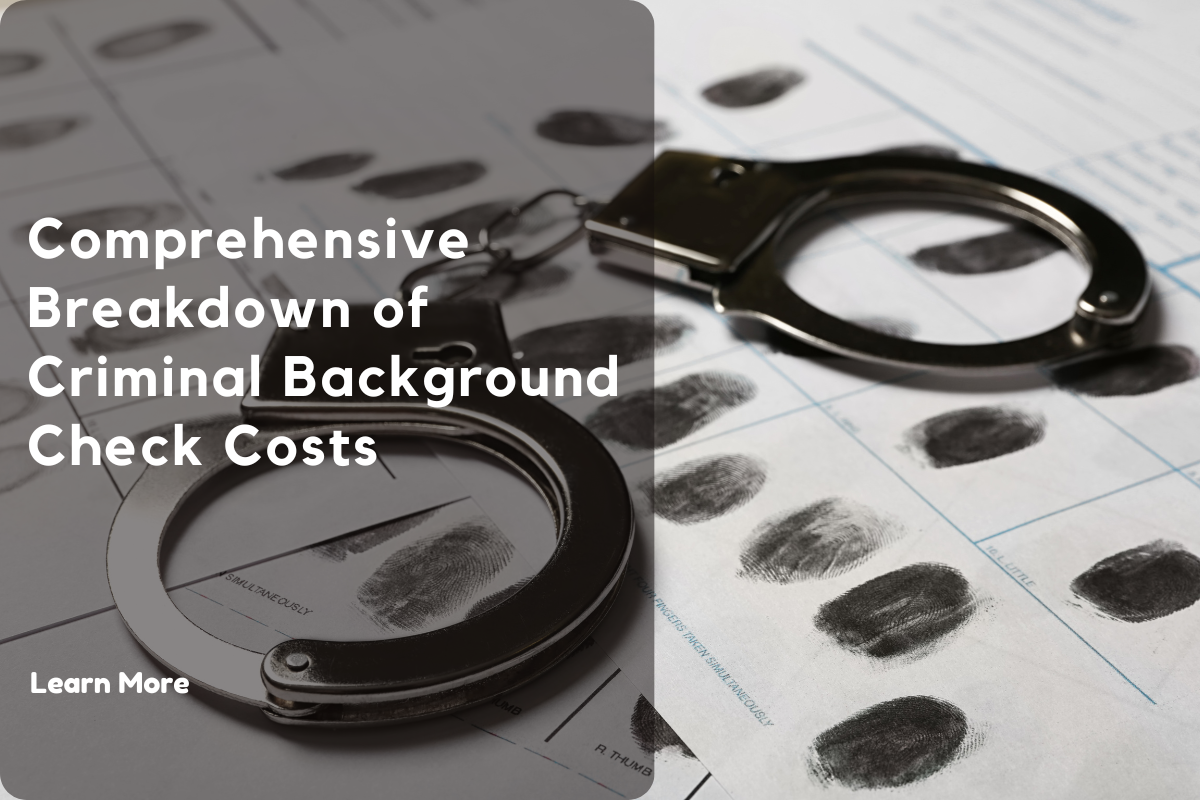 Introduction to Criminal Background Checks and Their Costs
Introduction to Criminal Background Checks and Their Costs
What is a Criminal Background Check?
A criminal background check is an investigation into an individual’s criminal history to evaluate their potential risks in a variety of contexts. These checks are essential tools used by employers, landlords, law enforcement, and others who need to make informed decisions about individuals. Criminal background checks help determine if a person has any previous legal infractions, including arrests, convictions, and pending charges, which might affect their suitability for certain jobs, housing, or other activities.
For employers, background checks are especially important when hiring for sensitive positions, such as those involving the safety of others or the handling of sensitive information. For landlords, criminal checks provide assurance that tenants are unlikely to pose a threat to the property or neighbors. Background checks also play a vital role in adoption processes, volunteer screenings, and gun ownership applications.
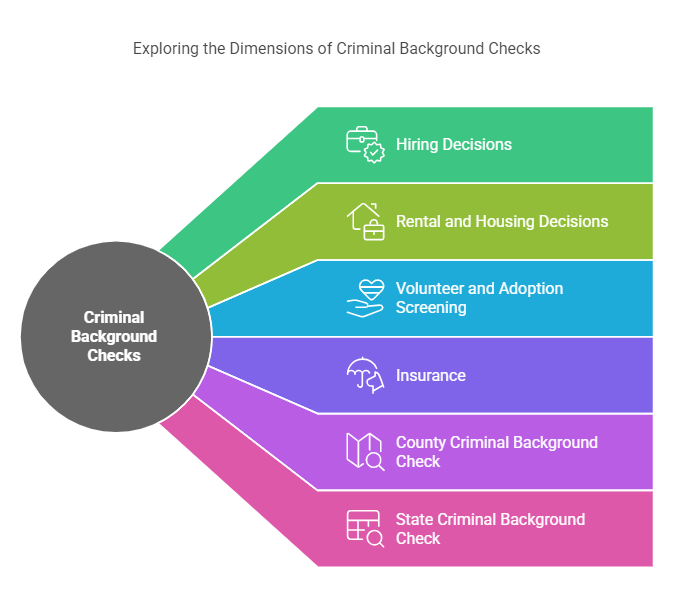
Why Are Criminal Background Checks Necessary?
The use of criminal background checks is a critical step in the decision-making process for many organizations and individuals. Here are the most common reasons why criminal background checks are performed:
- Hiring Decisions: Employers, especially those in industries that involve high-risk environments or sensitive positions (e.g., healthcare, financial services, childcare), rely on criminal background checks to ensure that job applicants are trustworthy. These checks are necessary to confirm the absence of disqualifying factors such as violent crimes, theft, or drug-related offenses.
- Rental and Housing Decisions: Landlords use criminal background checks to verify that potential tenants do not have a history that could pose a danger to others in the building or lead to damage or legal disputes. A criminal background check is often a standard part of the rental application process.
- Volunteer and Adoption Screening: Organizations that work with vulnerable populations (e.g., children, elderly, or disabled individuals) often require criminal background checks to ensure that volunteers or potential adoptive parents do not have criminal histories that could endanger those they are meant to serve.
- Insurance: Some insurance companies also perform criminal background checks to assess the risk level of insuring an individual, especially when it comes to high-risk policies like auto insurance or home insurance.
Types of Criminal Background Checks
Criminal background checks come in various forms, each providing different levels of detail based on the scope of the search. The main types of background checks include:
- County Criminal Background Check A county criminal background check focuses on criminal records from a specific county where the individual resides or has lived. This check typically includes data about misdemeanors, felonies, and any arrests or convictions within that county. County checks are often the most affordable, but they may not provide a comprehensive view of an individual’s criminal history if they have lived in multiple areas.
- State Criminal Background Check A state criminal background check accesses the records from a state’s Department of Justice or similar agency. This check can include convictions, arrests, and any other criminal activities from across the state. It’s more extensive than a county check, as it includes information from all counties within the state. State checks can reveal any state-level convictions or charges that may not be present in a county search.
- Federal Criminal Background Check A federal criminal background check is conducted at the national level and focuses on federal crimes that fall under federal jurisdiction. This includes serious offenses such as drug trafficking, fraud, or bank robbery. A federal check is more expensive than county or state checks due to the complexity of accessing federal databases and the type of crimes included.
- National Criminal Background Check A national criminal background check offers the broadest coverage by searching nationwide criminal records. This check typically includes state, county, and federal records. It provides a comprehensive overview of an individual’s criminal history, making it the most thorough but also the most expensive option. A national background check is commonly used by employers with a large workforce spread across multiple states, or when a highly detailed search is required.
Why Does the Cost of a Criminal Background Check Vary?
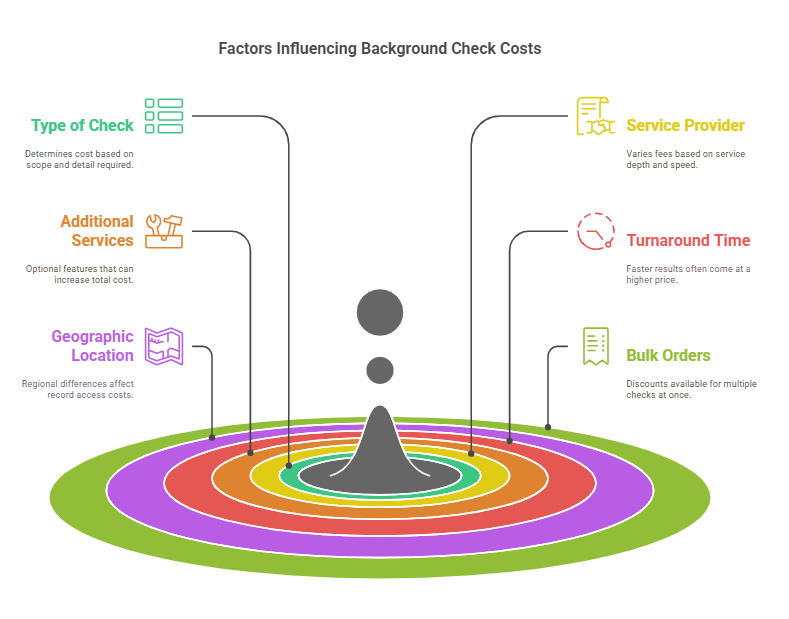
The cost of a criminal background check can fluctuate due to several factors. Understanding these cost drivers helps organizations and individuals budget for the screening process. Here are some of the main reasons why the price varies:
- Type of Background Check The scope of the check is a major factor influencing the cost. A county-level criminal check is generally the least expensive, as it focuses on records from just one county. On the other hand, a national criminal background check, which encompasses multiple jurisdictions, tends to be more costly. The more comprehensive the search, the higher the price.
- Service Provider Different service providers charge varying fees for conducting criminal background checks. Some providers specialize in affordable, fast services, while others offer more in-depth searches at a higher price. Additionally, Rapid Hire Solutions is a reputable provider that offers criminal background check services at competitive rates. Their platform streamlines the process for both employers and individuals, providing quick and accurate results at reasonable prices.
- Additional Services Some background check services include optional add-ons that may increase the total cost. These can include fingerprint-based checks, expedited processing, or the verification of specific types of offenses, such as drug convictions or domestic violence. Depending on the circumstances and the level of security required, these additional services can significantly affect the overall cost.
- Turnaround Time Many background check services offer expedited processing options for those who need results quickly. While standard background checks may take a few days to process, expedited services allow clients to receive results within hours. However, expedited services usually come at a premium price.
- Geographic Location The cost can also vary based on the geographic location of the search. Some states and counties may charge more for accessing records, and the processing fees can be different from one region to another. Additionally, some states have more stringent requirements for background checks, which can lead to higher costs.
- Bulk Screening Orders For organizations conducting background checks on multiple candidates or employees, many providers offer bulk pricing or discounts. Employers who need to run numerous background checks at once can often save money by opting for bulk rates. These discounts can significantly reduce the cost per check when large numbers of screenings are required.
Factors Influencing the Cost of Criminal Background Checks
Criminal background checks are an essential tool for employers, landlords, and various organizations to ensure safety and compliance. However, the cost of these checks can vary significantly depending on several factors. In this section, we will explore the various elements that influence the cost of a criminal background check, including the type of check, geographic location, additional services, and the provider used. Additionally, we will discuss the potential costs involved and provide a comparison table to offer a clearer picture of the pricing structure.
Key Factors Affecting the Cost of Criminal Background Checks
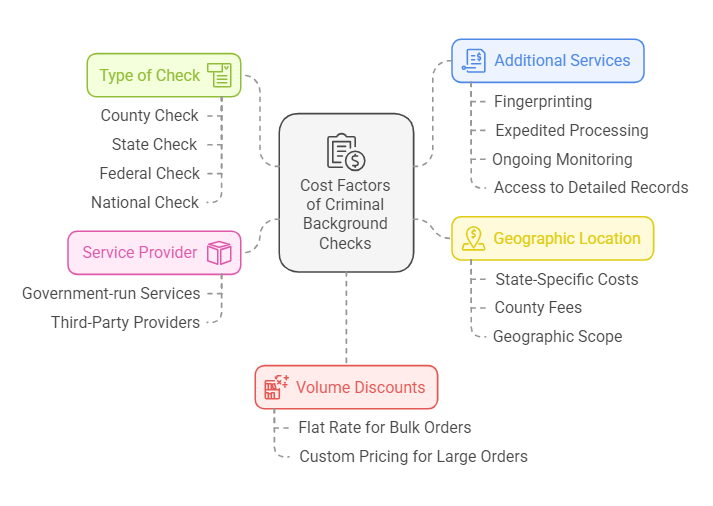
Several factors determine the cost of a criminal background check. Understanding these factors can help individuals and organizations budget more effectively and make informed decisions when choosing a background check service. Here are the primary considerations:
1. Type of Criminal Background Check
One of the most significant factors influencing the cost of a background check is the type of criminal history search being conducted. As mentioned in above, the three primary types of criminal background checks are:
- County Criminal Background Check: The least expensive option, typically ranging from $10 to $30. It only looks for criminal records within a specific county, which may be adequate for many situations but does not provide a full scope of an individual’s criminal history.
- State Criminal Background Check: These checks search criminal records within a particular state and typically cost between $20 and $50. Statewide checks are more comprehensive than county checks and can include offenses from multiple counties within the state.
- Federal Criminal Background Check: Federal checks are the most costly, often ranging from $30 to $80, depending on the service provider. They look for offenses under federal jurisdiction, such as large-scale fraud, money laundering, or trafficking.
- National Criminal Background Check: A national check offers the most comprehensive search and typically costs between $50 and $100. It combines state, county, and federal criminal records to give a complete history. This check is most appropriate when a highly detailed background search is required.
Each of these checks provides varying levels of detail and coverage, and as expected, the more comprehensive the check, the higher the cost.
2. Service Provider
The company you choose to conduct a criminal background check can also impact the overall cost. There are two main categories of service providers:
- Government-run Services: In some cases, individuals or organizations can access criminal background checks directly from government websites, such as state police departments or county clerk offices. These services tend to be more affordable or even free, depending on the jurisdiction, but they can be time-consuming, and the process may not be as user-friendly.
- Third-Party Providers: Companies like Rapid Hire Solutions offer streamlined criminal background check services for both employers and individuals. While third-party services typically charge a fee, they provide convenience, speed, and additional services that can make the process easier. These services may also include expedited processing and access to more detailed records that aren’t available through government sites. Rapid Hire Solutions provides an easy-to-use platform with competitive pricing for both simple and complex background checks, helping clients save time and effort.
The advantage of using third-party providers is their reliability, thoroughness, and the ability to obtain results quickly. However, this convenience comes at a cost, which is reflected in the price.
3. Geographic Location
The geographic location of the background check plays a role in the overall cost. Here’s why:
- State-Specific Costs: Some states may charge higher fees for accessing criminal records, and others may have more stringent processes for releasing this information. For instance, if you need to obtain a background check for a person who has lived in multiple states, you may need to access criminal records from multiple jurisdictions, increasing the cost.
- County Fees: If you are conducting a county criminal background check, the fee can vary depending on the county itself. Some counties charge a flat rate, while others base their fees on the number of records being searched. Larger counties may also have higher costs due to the volume of records they manage.
- Geographic Scope: If you are looking for a national background check, the cost is higher due to the need to access records across multiple states and federal jurisdictions. The more extensive the search area, the higher the associated cost.
4. Additional Services and Features
Many background check providers offer additional services that can increase the total cost of a criminal background check. These services include:
- Fingerprinting: Some employers, especially in certain industries such as healthcare or law enforcement, may require fingerprint-based background checks. These checks are typically more accurate than name-based searches but also come with higher fees. The cost of fingerprinting usually ranges from $20 to $50, in addition to the regular background check fee.
- Expedited Processing: For time-sensitive situations, many companies offer expedited processing to ensure that the results are available within hours or even minutes. This added convenience often comes at a premium, with expedited services typically costing an additional $10 to $30 or more.
- Ongoing Monitoring: Some services offer continuous criminal background monitoring for individuals or employees. This service is especially useful for organizations that want to ensure an individual’s criminal history remains clean over time. Ongoing monitoring may cost between $5 and $25 per month, depending on the service.
- Access to More Detailed Records: Some checks can be customized to include more detailed information, such as drug convictions, domestic violence charges, or driving records. These specialized checks are typically more expensive due to the additional effort required to gather these records.
5. Volume Discounts for Bulk Orders
Organizations that need to conduct criminal background checks on multiple candidates or employees may qualify for volume discounts. These discounts can significantly reduce the cost per background check, making it more affordable for large-scale hiring efforts or regular screenings. Some providers may offer discounts for bulk orders, such as a flat rate for 10 or more background checks, or provide custom pricing for very large orders.
Breakdown of Typical Criminal Background Check Costs
To give a better understanding of the pricing landscape, here is a comparison table of typical costs for different types of criminal background checks. Keep in mind that these are average costs, and the actual prices may vary based on the provider and specific circumstances.
| Type of Criminal Background Check | Average Cost Range |
|---|---|
| County Criminal Background Check | $10 – $30 |
| State Criminal Background Check | $20 – $50 |
| Federal Criminal Background Check | $30 – $80 |
| National Criminal Background Check | $50 – $100 |
| Fingerprinting (Additional Fee) | $20 – $50 |
| Expedited Processing | $10 – $30 |
| Ongoing Monitoring | $5 – $25/month |
Legal Aspects of Criminal Background Checks
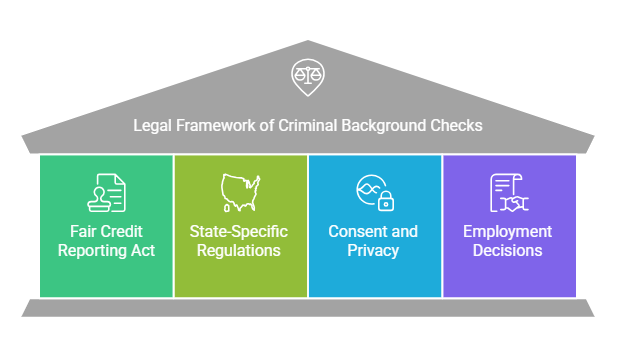
When conducting or undergoing a criminal background check, it is crucial to understand the legal framework that governs these processes. Various laws and regulations are in place to protect individuals’ privacy and ensure that background checks are conducted fairly. Some of the primary legal considerations include:
1. The Fair Credit Reporting Act (FCRA)
The Fair Credit Reporting Act (FCRA) is a federal law that regulates the collection, dissemination, and use of consumer information, including criminal background checks. The FCRA applies to most background checks conducted by third-party providers, including checks used for employment, housing, and credit. Key provisions of the FCRA include:
- Disclosure: Employers and other entities must inform individuals that they will be conducting a background check before doing so. This is typically done through a consent form.
- Adverse Action: If an employer or landlord decides to take adverse action (e.g., not hiring or renting to an individual) based on information found in a criminal background check, they must provide a copy of the report and a notice of the decision. This allows individuals the opportunity to dispute any inaccuracies in the report.
- Accuracy: The FCRA requires that background check reports be accurate and up-to-date. If a report contains incorrect information, individuals have the right to dispute the error and have it corrected.
2. State-Specific Regulations
In addition to federal regulations, many states have their own laws governing the use of criminal background checks. For example:
- Ban the Box Laws: Several states and cities have enacted “Ban the Box” laws, which prohibit employers from asking about criminal history on initial job applications. This is to give individuals a fairer chance at employment without being immediately disqualified due to past offenses.
- Sealing or Expunging Criminal Records: Some states allow individuals to have certain criminal records sealed or expunged after a certain period. This means that criminal offenses will not appear on background checks, providing individuals with a fresh start.
- Time Limitations: Some states impose limitations on how far back criminal background checks can go, particularly for non-conviction records or arrests that did not result in a conviction.
3. Consent and Privacy
Another critical legal consideration is obtaining consent for a background check. Under both federal and state law, employers and landlords must obtain written consent before conducting a criminal background check. Additionally, background checks must adhere to privacy laws to protect sensitive personal information.
In some jurisdictions, individuals may be able to request their own criminal background checks, ensuring that the information being collected is accurate and up to date. This is particularly important for people who may be concerned about how their background check could impact their job search or rental applications.
4. Use of Criminal Records in Employment Decisions
The use of criminal records in employment decisions is governed by both the FCRA and the Equal Employment Opportunity Commission (EEOC) guidelines. Employers cannot automatically disqualify a job applicant based on a criminal conviction, particularly if it is not directly related to the job in question. Factors that may influence an employer’s decision include:
- The nature of the crime.
- The time that has passed since the offense.
- The applicant’s qualifications and rehabilitation efforts.
- Whether the offense is related to the duties of the job.
Employers are encouraged to evaluate criminal background checks on a case-by-case basis, weighing the relevance of the criminal history in relation to the job position.
Frequently Asked Questions (FAQs)
In this section, we will answer some common questions related to the cost and use of criminal background checks. These FAQs will help clarify any doubts you may have about the process.
Why do criminal background checks cost so much?
The cost of criminal background checks can vary based on the level of detail required and the type of search. More comprehensive checks, such as national or federal criminal background checks, typically cost more due to the extensive research involved. Additionally, third-party services often charge higher fees because they provide more convenience, faster results, and more in-depth searches than government-run services.
Can I get a free criminal background check?
While some states and jurisdictions offer free access to basic criminal records, comprehensive background checks usually come with a fee. Some online services provide free background check reports, but these are often limited in scope and may not include critical details like federal or state-specific criminal records.
What is the difference between a national and a local criminal background check?
A national criminal background check includes records from multiple states and federal jurisdictions, providing a broader scope of an individual’s criminal history. A local or county criminal background check, on the other hand, only searches records within a specific county or jurisdiction. National checks tend to be more expensive because they cover a wider range of sources.
How long does it take to get the results of a criminal background check?
The timeline for receiving the results of a criminal background check can vary depending on the type of check and the service provider. A county criminal background check may take only a few days, while a federal background check or a more extensive national check could take up to a week or more. Expedited services are available for those who need faster results.
Are there any discounts for bulk background check orders?
Yes, many providers offer discounts for bulk orders of criminal background checks. Organizations that need to conduct multiple checks for hiring purposes or compliance may be eligible for reduced rates when ordering a large volume of checks. Providers like Rapid Hire Solutions often offer customized pricing for large orders, helping businesses save money.
Why do criminal background checks cost so much?
The cost of criminal background checks can vary based on the level of detail required and the type of search. More comprehensive checks, such as national or federal criminal background checks, typically cost more due to the extensive research involved. Additionally, third-party services often charge higher fees because they provide more convenience, faster results, and more in-depth searches than government-run services.
Can I get a free criminal background check?
While some states and jurisdictions offer free access to basic criminal records, comprehensive background checks usually come with a fee. Some online services provide free background check reports, but these are often limited in scope and may not include critical details like federal or state-specific criminal records.
What is the difference between a national and a local criminal background check?
A national criminal background check includes records from multiple states and federal jurisdictions, providing a broader scope of an individual’s criminal history. A local or county criminal background check, on the other hand, only searches records within a specific county or jurisdiction. National checks tend to be more expensive because they cover a wider range of sources.
How long does it take to get the results of a criminal background check?
The timeline for receiving the results of a criminal background check can vary depending on the type of check and the service provider. A county criminal background check may take only a few days, while a federal background check or a more extensive national check could take up to a week or more. Expedited services are available for those who need faster results.
Are there any discounts for bulk background check orders?
Yes, many providers offer discounts for bulk orders of criminal background checks. Organizations that need to conduct multiple checks for hiring purposes or compliance may be eligible for reduced rates when ordering a large volume of checks. Providers like Rapid Hire Solutions often offer customized pricing for large orders, helping businesses save money.
Conclusion
Throughout this article, we’ve explored the essential aspects of criminal background checks and their costs. From understanding the different types of checks to delving into the factors that influence pricing, we’ve covered everything you need to know about how much criminal background checks cost and why these services vary in price. Additionally, we’ve examined the legal aspects that govern the use of criminal records in employment and housing decisions, ensuring that individuals and employers alike are informed of their rights and responsibilities.
Finally, when considering criminal background checks, it’s important to use a trusted service provider like Rapid Hire Solutions. They offer competitive pricing, streamlined processes, and reliable results to ensure your background checks are thorough, accurate, and compliant with all relevant regulations.
Understanding the costs and legal implications of criminal background checks helps ensure you make informed decisions for your hiring, leasing, and other screening needs.
